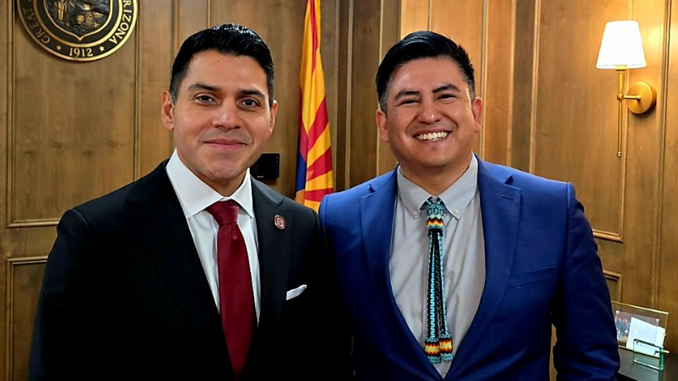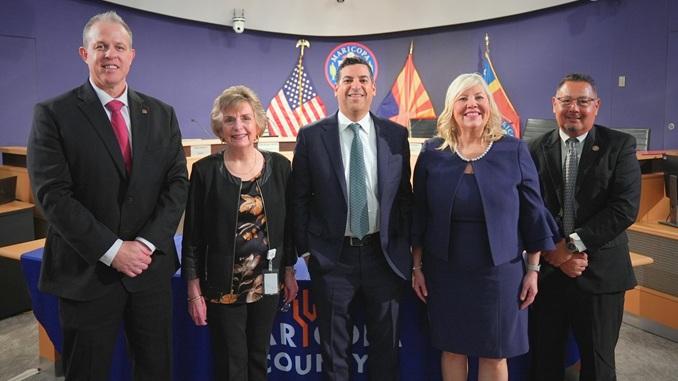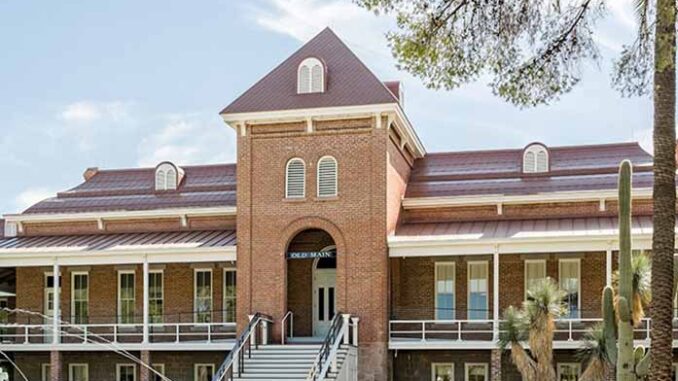
by Staff Reporter | Feb 17, 2026 | News
By Staff Reporter |
The state’s audit of Maricopa County’s annual financial report found significant reporting weaknesses.
The review raised concerns over the state of the county’s IT security systems and data maintenance. Some of these recommendations aren’t new — some were areas the auditor general had recommended in the last two fiscal years.
The auditor general’s office issued their audit on last week which addressed the county report for the 2025 fiscal year released in December.
Their review found that the county had significant deficiencies in internal control, characterized as less severe than material weaknesses, which would justify the reasonable possibility that a material misstatement of basic financial statements wouldn’t be prevented or detected and corrected on a timely basis.
The report focused on two financial statement findings that may have the potential to harm county operations, IT systems, and data.
Firstly, the auditor general found that the county’s administration and IT management had an inadequate process for identifying, classifying, and inventorying sensitive information requiring stronger access and security controls. This was found to be due to the county’s failure to fully integrate its new data classification policy across all applications and financial systems.
The auditor general recommended a complete implementation of policies and procedures to manage IT systems and data risks, and an identification, classification, and inventory of information requiring stronger access and security controls.
Secondly, the auditor general found insufficient development, documentation, and implementation to IT systems and data risks. The county showed it had poor procedures incapable of preventing or detecting unauthorized or inappropriate IT systems and data access, along with ensuring securely maintained configuration settings.
The county also lacked controls for its IT security policies and procedures intended to prevent unauthorized or inappropriate access or use, manipulation, damage or loss. Furthermore, the county’s contingency plan lacked key elements for operations restoration in the event of a disaster or system interruption.
With this second set of problems, county administration and IT management attributed shortcomings to partial implementation and failure to fully implement established procedures concerning logical access restrictions, changes to policies and procedures managing configurations and changes, system activity monitoring for users with administrative access privileges, and the disaster recovery plan.
The auditor general recommended the county monitor all employees’ adherence to access and contingency-planning IT policies and procedures, not to mention develop, document, and implement IT policies and procedures for configuration. With their suggested review, the auditor general recommended restricting access to IT systems and data, creating processes for proposed security impact changes, performing proactive key user and system activity logging and log monitoring, and testing a contingency plan.
For both problems discovered, the auditor general’s office stressed creating internal controls that follow a credible industry source, suggesting the National Institute of Standards and Technology.
In its response to the audit, the county said, in brief, that it would address and implement the findings by June 30 of this year, about a month before the primary election is scheduled to occur. The county didn’t elaborate at length on its plans to remedy the two problems presented by the auditor general’s office.
AZ Free News is your #1 source for Arizona news and politics. You can send us news tips using this link.

by Staff Reporter | Feb 16, 2026 | Education, News
By Staff Reporter |
The lone conservative voice for the Phoenix Union High School District (PXU) governing board resigned on Friday.
Jeremiah Cota blamed “unfounded and baseless attacks” by the rest of the board against him for his resignation. Cota said the district suffered “gross maladministration and injurious governance” and a “fiscally unsustainable path” under the rest of the board.
“I have been stunned to see how this board and district have engaged in a pattern of harassment and discrimination against fellow community and board members, including the baseless and unfounded accusations against myself,” said Cota. “As an enrolled member of the federally recognized San Carlos Apache Tribe, the outright persecution I have experienced as a board member from other members and direct personnel have jilted my relationships, caused damage and irrefutable harm, and created a toxic operating environment for both personal and professional endeavors.”
Cota was appointed to the board in June by the Maricopa County School Superintendent. Prior to his appointment, Cota worked for Reps. Paul Gosar and Andy Biggs.
Since being on the board, Cota has called public attention to a number of causes for concern within the district: increased violence following rejection of campus officers and contracts with left-wing activist groups, to name a few.
Last fall, the board was hit with significant budget reductions and staff layoffs over the steep decline in enrollment. District leadership, apart from Cota, blamed school choice and Republicans for their budget shortfalls.
Activists launched a campaign for his removal over his attendance at a Christmas party with fellow conservatives following Turning Point USA’s annual AmericaFest in December.
Secular AZ organized a petition that began circulating last month calling for Cota’s resignation, picked up by local media. Over 600 people signed the petition. Secular AZ also created social graphics to complement their campaign against Cota.
Board President Francisco Pastor-Rivera signaled support for the petition in interviews.
“As a board member, you represent making decisions that impact a student’s future. I think this attendance itself, and this action shows true colors all together,” said Pastor-Rivera. “I really question if a person is representing the values of the community that they serve.”
Cota inspired the ire of district leadership about a month after joining the board when he declined to recite a land acknowledgment statement, instead offering a prayer to God. Cota later went a step further and requested to remove the land acknowledgement statement entirely.
The board parliamentarian prevented Cota from finishing his prayer and told him that religious prayer could not occur before the land acknowledgment statement.
The denial of Cota’s commitment to a public display of his Christian faith spurred a legislative response in the form of House Bill 2110.
One of the leaders of Secular AZ and repeat political candidate for various offices, Jeanne Casteen, accused Cota of indoctrination in media interviews.
“They shouldn’t have been praying in the first place. If you want to pray, you can do it before the meeting and silently,” said Casteen.
More recently, Cota led the lone charge on the board to take disciplinary measures against staff who participated in anti-ICE protests on campus.
AZ Free News is your #1 source for Arizona news and politics. You can send us news tips using this link.

by Staff Reporter | Feb 15, 2026 | News
By Staff Reporter |
The Maricopa County Board of Supervisors is divided on moving forward with a pathway that may result in the recorder’s removal, even with little time left before the primary election.
The board published a statement Wednesday announcing their vote requiring Recorder Justin Heap to provide a written report and sworn public testimony on February 18.
The board statement accused Heap of “lying to the public” and stonewalling the board.
“He has been unreliable. He has been unprofessional. He has been untruthful. He has been unaccountable,” read the statement. “The Board cannot responsibly set a budget, make policy decisions, or oversee county operations, including an active election in Tempe right now, without complete and truthful information from Mr. Heap.”
The board made its decision during its formal meeting on Wednesday. State law authorizes the board to require any county officer to make reports under oath concerning office duties.
The written report would address key issues identified in Chair Kate Brophy McGee’s letter to Heap last month concerning expenditures and prepayments, signature verification and curing, and the special election board and deputy registrar program.
Heap will also be required to provide the identities of the provisional voters his office said were disenfranchised; records of requests by his office for federal funds, legislative appropriations, or county funds; communications with the Maricopa County Attorney’s Office concerning the distribution of mail-in ballots to voters who didn’t request them in the 2025 special election in Congressional District 7; and records of the reassignment of the space in the Maricopa County Tabulation and Election Center from the Maricopa County Sheriff’s Office to his office.
Although the supervisors voted unanimously to impose these requirements on Heap, not all supervisors supported the official statement condemning Heap.
Supervisor Mark Stewart said the statement wasn’t approved by him. Not only that, Stewart said, but the remarks were disrespectful and potentially damaging to current negotiations with Heap.
“We are in active negotiations on the Shared Services Agreement, and my focus remains on reaching a constructive resolution that delivers results for the people we serve,” said Stewart.
Other supervisors fanned the flames of the statement.
Supervisor Debbie Lesko shared her remarks from Wednesday’s meeting, in which she said she endured over a year of frustrations with Heap. Lesko lodged multiple accusations against Heap, such as that he had something to hide.
“I feel Recorder Heap has left us no alternative,” said Lesko.
The only alternative for the board would be to continue negotiations with the recorder’s office through public discussions and the court.
This pathway by the board may lead to the largest county in the state and fourth-largest county in the nation without its elections leader with a few months left to go before elections begin. The primary election was moved up from August to July recently.
Should Heap refuse to comply with Wednesday’s order, the board may opt to remove the recorder from office with just five months to go before the primary elections.
This latest action by the board appears to be their response to the Maricopa County Superior Court striking down the board’s attempt to subpoena three staff members within Heap’s office. This court restraining order occurred within the case initiated by Heap last summer to restore elections powers to his office.
AZ Free News reached out to Heap regarding the board’s decision. As of this report, no response has been received.
AZ Free News is your #1 source for Arizona news and politics. You can send us news tips using this link.

by Staff Reporter | Feb 14, 2026 | News
By Staff Reporter |
Karrin Taylor Robson announced the suspension of her gubernatorial campaign on Thursday.
Robson cited concerns about the possible effects of “a divisive Republican primary” as the November 2026 election approaches as her reason for stepping out of the race.
“It only weakens our conservative cause and gives the left exactly what they want: a fractured Republican Party heading into November,” said Robson. “With so much on the line in 2026, I am not willing to contribute to that outcome.”
Robson shared an endorsement from President Donald Trump with another primary opponent, Congressman Andy Biggs, this go around.
Trump handed Robson the endorsement first in December 2024 during Turning Point USA’s annual “AmericaFest” convention in Phoenix. When Biggs announced his run early last year, Trump made an unusual but not altogether unprecedented decision and put up a second endorsement for Biggs: the less moderate Republican and former Freedom Caucus chair.
When he announced his dual endorsement, Trump said he had endorsed Robson because there were no other candidates at the time.
“I like Karrin Taylor Robson of Arizona a lot, and when she asked me to Endorse her, with nobody else running, I Endorsed her, and was happy to do so,” said Trump. “When Andy Biggs decided to run for Governor, quite unexpectedly, I had a problem — Two fantastic candidates, two terrific people, two wonderful champions, and it is therefore my Great Honor TO GIVE MY COMPLETE AND TOTAL ENDORSEMENT TO BOTH. Either one will never let you down. MAKE AMERICA GREAT AGAIN!”
Trump split his endorsement in the 2024 congressional race between Blake Masters and now-Rep. Abe Hamadeh.
About a month after Trump split his endorsement between Robson and Biggs, three key allies from Trump’s circle split from Robson’s campaign. Two of those individuals served as Robson’s advisors after playing key roles in engineering Trump’s successful 2024 reelection. Sources said the allies left after Robson refused to run campaign ads with Trump’s endorsement immediately; instead, Robson waited until after Biggs got his endorsement to announce.
Robson, a former Arizona Boards of Regents member appointed by former Gov. Doug Ducey, made an unsuccessful primary run against failed Republican candidate Kari Lake in the 2022 gubernatorial election. That year, Lake was the sole Republican gubernatorial candidate to enjoy Trump’s endorsement.
With Robson out of the race, that leaves Biggs, Congressman David Schweikert, and local business owner Scott Neely gunning to win the primary in July.
Republican leaders responded to Robson’s campaign suspension with gratitude for her service to the state. Right-wing political and grassroots leaders also signaled Robson’s suspension as a unifying call to back Biggs in the race. Robson didn’t endorse another candidate.
State Senate President Pro Tempore T.J. Shope (R-LD16) told Robson he would continue to work with her on policy, and further expressed his endorsement of Biggs.
Likewise, Turning Point USA affiliates and leaders issued statements thanking Robson and encouraging voters to get behind Biggs.
A majority of the latest polls predicted Biggs would have double-digit leads in the upcoming primary election over Robson.
AZ Free News is your #1 source for Arizona news and politics. You can send us news tips using this link.

by Staff Reporter | Feb 13, 2026 | Education, News
By Staff Reporter |
New email records reveal the University of Arizona (U of A) misled the public about a donation from Jeffrey Epstein.
Email records first reported on by FOIAzona proved Epstein’s donation was not “anonymous” as U of A’s vice president for communications at the time, Chris Sigurdson, claimed. U of A’s associate vice president of external communications at the time, Pam Scott, also claimed that the university had no knowledge because Epstein was not listed on the board of directors with the charity through which he donated, Gratitude America.
“At the time the donation was made by Gratitude America Ltd., Jeffrey Epstein was not listed on the board of directors and the university was unaware of his involvement,” she said. “We have no plans to repay this contribution.”
However, records reveal Epstein’s name was postmarked on the mailing documents containing the donation check bearing his charity’s name. The donation was made out to the University of Arizona Foundation.
Epstein’s $50,000 donation was made at the request of one U of A professor, Stuart Hameroff.
Hameroff’s team also helped Epstein’s team on where to send the donation. The university, through that professor’s program, gave Epstein’s charity public recognition for the donation.
In March 2017, Hameroff asked Epstein to fund an annual conference he put on through the interdisciplinary entity he founded over 30 years ago, the Center for Consciousness Studies. These conferences have occurred since 1994.
One of the center’s latest major donations was $2 million from a retired Google software developer. These funds align with the purpose of the funds put forth by Epstein: engineering consciousness. (The latest Epstein files release revealed Epstein sought, among his other endeavors into transhumanism, to create a behavioral engineering institute at Stanford University).
Hameroff is a leader with the U of A sciences: he cofounded and chairs the Center for Consciousness Studies, cochairs the Science of Consciousness, and serves as professor emeritus of the Departments of Anesthesiology and Psychology.
Hameroff didn’t need to provide Epstein with details before the financier pledged a minimum sponsorship of $50,000.
“Who are the speakers and what is the cost?” wrote Epstein. “I’m in for at least $50,000, before knowing anything.”
Epstein’s trust in Hameroff likely stemmed from the personal relationship the pair shared. The Epstein library presently returns multiple records mentioning Hameroff from 2016 through 2018.
Hameroff stayed at one of Epstein’s apartments in New York for multiple days leading up to Halloween in 2016, arranged by Gino Yu, associate professor and director of game development at Hong Kong Polytechnic Institute. Yu referred to Epstein as his “benefactor,” per Hameroff.
Hameroff called the night “memorable” in an email after the fact.
“We appreciate you staying up late with an early flight. We were tired too, but it was a memorable night,” wrote Hameroff.
Yu also wanted James Tagg, an inventor and engineer with Penrose Institute, to attend the October 2016 meeting with Epstein and Hameroff. It’s unclear if Tagg attended. However, Hameroff did later ask Epstein to provide seed money for another project, the Penrose Institute, in May 2017 during discussions of the Center for Consciousness Studies conference.
Other recently released Epstein records revealed that an investment banker and fellow Epstein affiliate, Robert Lawrence Kuhn, directed Epstein to review another consciousness program advised by Hameroff, the Shanghai Science of Consciousness Program. That email exchange took place in February 2017. It appears that program was a reference to a canceled attempt to hold the Center for Consciousness Studies conference in Shanghai, per emails.
“Attached is the Shanghai Science of Consciousness program (Stuart Hameroff put together; I advised),” said Kuhn.
Epstein, via his charity Gratitude America, was featured as a sponsor that “made the conference a reality” per program documents. Emails affirmed this promotion, as well as offers to pay for a hotel room for Epstein’s attendance at the conference.
Another U of A faculty member and famed political activist, Noam Chomsky, was a friend of Epstein as well. Chomsky was included in Epstein’s “little black book.”
AZ Free News is your #1 source for Arizona news and politics. You can send us news tips using this link.





